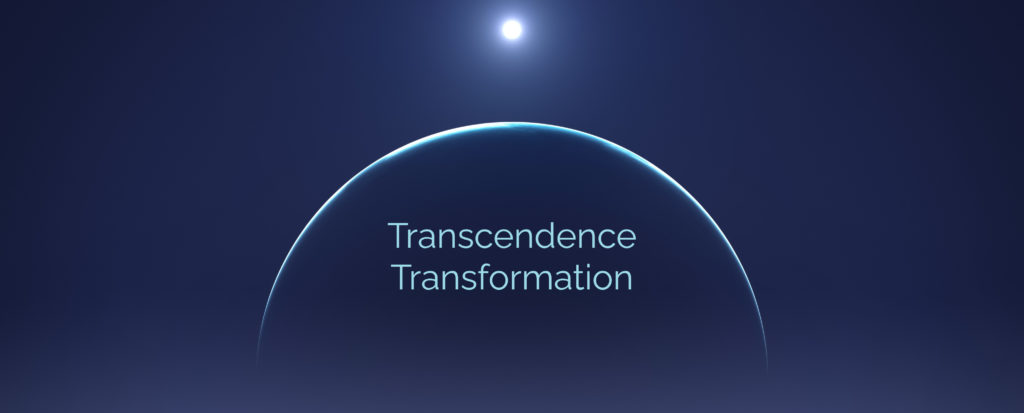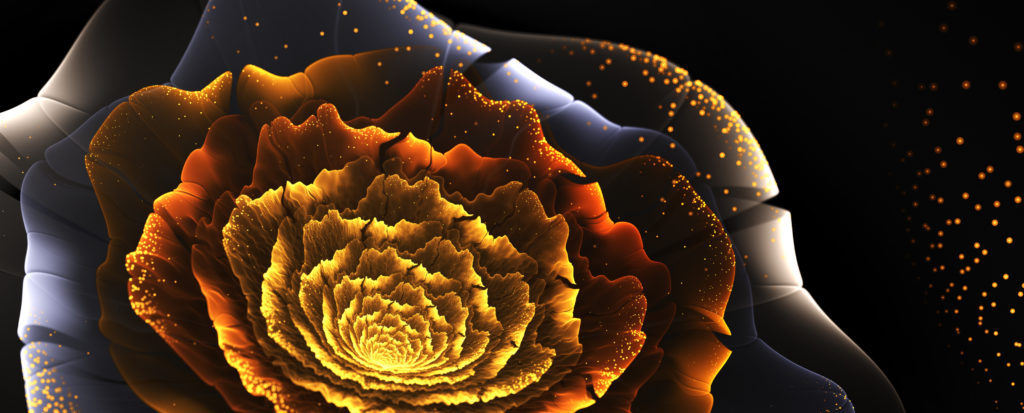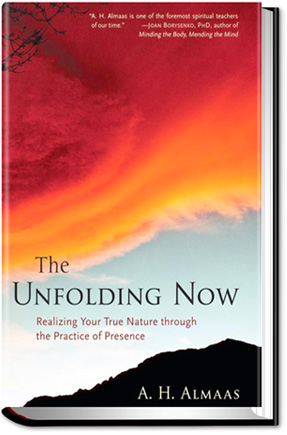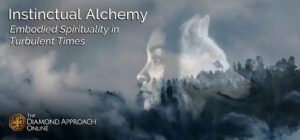
From the beginning. . .
…it’s important to know the distinction between spiritual transcendence and spiritual transformation.
Most teachings, especially those that come from the East or are influenced by the East, tend to emphasize spiritual transcendence and teachings that come from the West, like the Kabbalah, tend to emphasize spiritual transformation.
This doesn’t mean they are mutually exclusive.
(This post is derived from a recorded live presentation. Some minor edits have been made. Quotes and images added for emphasis and to show a certain amount of agreement between other recognized nondual teachers.)
Dictionary Definitions:
- Transcendence: existence or experience beyond the normal or physical level.
- Transformation: a thorough or dramatic change in form or appearance; a metamorphosis during the life cycle of an animal.
This definition does not exactly fit the meaning of our usage of transformation. Our use of transformation is not a change in form, but a change in what is possible in experience, functioning and identity.
Nondual Transcendence
Many teachings these days, especially those identifying themselves as nondual teachings, emphasize spiritual transcendence, meaning ‘states of being’ that are beyond one’s normal experience, beyond the self, beyond the individual, beyond the human being – experiencing yourself like a vast space, or infinite awareness that is beyond any particulars, including the particular of being you, as you usually know yourself.
There are many states of transcendence.
Sometimes, you might get the idea that spiritual transcendence means a certain state called the absolute or pure awareness. These are states of transcendence. The fact is that there are many states of transcendence, but different traditions might take one of them as their ultimate or destination.
Many teachings emphasize transcendence into the state of pure silence or the vastness of pure peace. This way you’re away from all of the particulars of your life, from the trouble of your mind and then you’re free, which of course can happen as an experience. But as you probably know, that experience doesn’t last. Even if it lasts, which happens to some, it does necessarily mean that one’s behavior and life have transformed.
That doesn’t mean there aren’t different phases of awakening, different depths of awakening, because there are. The idea that all awakening is the same is ridiculous. Not all awakening is of the same depth. That can vary tremendously. But to touch a little reality is still to touch reality. We don’t want to underestimate the value of any degree of awakening. Any degree of awakening is actually extraordinary. It has an incredible value to it. – Adyashanti
So, you’ll have tastes if you’re lucky but, the deeper realization of the path of transcendence is to recognize that we are beyond the particulars, not of our body or mind, or even the particulars of the universe.
Why do we appear to be estranged from our true Self?
…the consciousness which has been restricted to the body is in reality the limitless, universal consciousness… [nondual Awareness]. What is to be understood is that “I,” the Self, comprises all things; this unity is to be understood thoroughly… Consciousness within the body gets itself entangled in the various concepts which it has been given and which it has acquired and now considers as part of itself.
Consciousness opens the gate for you to transcend consciousness. There are two aspects; one is conceptual, dynamic consciousness which is full of concepts, and the other is transcendent consciousness. – Nisargadatta Maharaj
(This is the nondual view of transcendence, and there are others.)
Transcendence is half of the spiritual path.
The other half is transformation. Even though the transcendence might be difficult to get to, it is actually easier to accomplish than the transformation. The transformation takes works, takes time. It takes patience. It takes dedication. It takes commitment to practice the path you are following.

What is transformation?
Why do we talk about transformation?
By transformation, I don’t mean that you’re transforming from being an individual of this life, to the transcendent states where you are beyond everything and evidently, free from everything.
You, as an individual, at the beginning, really take yourself to be the body and the mind, and your thoughts and feelings, and the life you have, and your relationships, and your history, and your mother and father, and your kids – and all of that That’s normal. That’s an ordinary state of a human being.
Transformative Subjective Experience
But, let’s not look at experience, like seeing something or hearing something, but at your inner experience, your subjective experience. What are you experiencing inside you? Is your mind buzzing? Are you aware of some feeling or discomfort in the body? Do you have some pain someplace or are you having some sensation, or no sensation?
Two types of subjective experience:
- Each person is in a different place of how much they are in touch with their inner experience, their subjective experience because subjective experience is a whole mosaic, a whole atmosphere. There’s a whole universe of experiences, thoughts, images, ideas, emotions, feelings, reactions, sensations of different kinds. All of them are combined together to form what we call our subjective experience.
- The other subjective experience is dominated by thoughts and emotions which are mostly reactions that are patterned by our past, by our history, sometimes by our culture or group that we identify with, or governed by our gender or sexual orientation, or our political persuasion. All of these determined our subjective experience, whether it is of frustration or sadness or quietness or spaciousness.
So everybody is in a different place.
It’s good to know where you are.
Some of us are more in touch with our emotions than others. Some of us don’t feel much emotion. Some of us are very much in touch with our tension pattern, our aches and pains. Some of us might feel the pain and ache, but we’re not aware of the tension patterns.
And, there’s some talk behind the pain because with the sense of being an ego self, goes with the states and structures. It’s in the patterning of the body, our experience with the body, the patterning of our hearts, how we experience our feelings and emotions and our feeling inside, and also in the pattern of our mind, our thoughts and images.

The Particulars of Experience
Wherever we happen to be, whether we are feeling nothing or we’re feeling some kind of impatience, whether we’re feeling a state of relaxation, or feeling full of thoughts, that can’t stop, our practice is to stay with our experience, not try to change it, but to let it be as it is.
That is how reality is presenting itself inside us at this present moment. We respect it and we embrace it without identifying with it. We embrace it to know it.
This is the practice we use for transformation of consciousness
We embrace our experience to find out what we are experiencing.
First of all, to know what we are means, what is happening inside us? What’s going on? Some of us might be experiencing our self as a vast stillness, wonderful, what’s that mean? What is that, and how is that related to the usual person that I happen to be? We don’t assume from the beginning that we know answers to these things, we take the position of innocence, a position of humility. We certainly don’t know all the meaning of our experience or why we have such experience.
What does it mean?
What do we find out if we really stay with it, be with it and begin to be curious about it, ask questions about it?
I’m feeling sad. Why am I sad? What’s the sadness about? You might find out that you’re sad because of all the trouble in the world. It makes you sad. You might find that all that you’re sad because your partner isn’t there for a while. They’re away, you miss them. Or you’re sad because someone on the phone said something that was hurtful.
You see, it might begin with sadness, but then you have an insight of what the sadness is about. And that’s not the end. Or you might begin with frustration or anger or fear, or as I said, even if you’re feeling love. Even if you feel love, how come you feel love? You feel love because you’re open. I’m giving you love and feeling love that way. You’re feeling my heart. How do you feel love? Because you’ve had good interaction with your wife or partner or friend, and you’re feeling sweet. And even if you’re feeling love that doesn’t end the exploration.
What is love,
what’s the experience of love?
What does it feel like? What does it taste like? Is it just love?
You like somebody, you appreciate them, but that is the effect on your mind, your consciousness, but what is the love itself?
Oh, I’m feeling sort of soft inside. Good, soft and what else? You might feel that there’s a texture to the softness, maybe the softness has a fluidity or a sense of a fluffiness that transforms your inner subjectivity.

Looking into,
being where we are,
not rejecting it.
Staying with where we are takes a great deal of practice, to not reject our experience. Rejecting our experience means we want it to change. It means we have an agenda, that we are looking at this because we want it to be different.
If you have that agenda, you’re already rejecting it. So if you’re rejecting it, that’s not bad. It means you didn’t know you wanted to reject it. Now you become aware, if you reject, that’s part of what’s happening inside, as part of your subjectivity. You want to learn about your rejection of your experience. You want to feel peaceful. You want to feel happy, which is all good.
If you begin to understand what you are without trying to change it, then what you are undergoes a transformation. – Jiddu Krishnamurti
So, these are examples of what I mean, what does it mean to have a subjective experience and how to approach it.
In the Diamond Approach, we approach it by letting it be, recognizing what it is, which means finding where we are in the experiential universe, where we are in our experience. And then exploring that experience, asking questions about it, being curious about it.
No Experience is Haphazard
We are not seeking transcendence, nor transformation. That would be rejecting where we are. However, we are open to transcendence and transformation just as we are open to all possibilities.
Experience is meaningful. It says something about you, about the totality of your psyche. This means that you are not just a body or the mind. You are a psyche, you are a psyche that includes emotions and sensations, and various kinds of experiences.
Every kind of experience has many dimensions of color and shape and texture and intensity. Each one of those is a whole universe.
What I’m saying is it’s not haphazard, it’s your experience. It’s not somebody elses experience, it is unique to you. It is unique to your psyche and it’s unique to your history and unique to your gender, and all of that, all of that is important.
To welcome your experience is welcoming yourself, accepting yourself and being interested in yourself.
Interest in yourself is the beginning of being interested in the truth, being interested in reality, because reality appears to you as your experience.
Reality doesn’t appear in the air someplace, no, it appears to you, within your experience, what we call our inner experience. That means we are our inner consciousness. There’s a feeling of consciousness.
It’s not like your feelings appear in your chest cavity. They appear within a sensitive medium. This sensitive medium, if you really explore it, you realize it’s not really physical. You cannot reduce it to the physical. It’s not because of the neurons in your brain or your limbic system. Those are involved, it is important, but that doesn’t explain why you have it the way you have it. The neuroscientists still don’t understand the Qualia of conscious. They don’t know how feelings happen. They don’t know how colors happen.
In philosophy and certain models of psychology, qualia (/ˈkwɑːliə/ or /ˈkweɪliə/; singular form: quale) are defined as individual instances of subjective, conscious experience. The term qualia derives from the Latin neuter plural form (qualia) of the Latin adjective quālis (Latin pronunciation: [ˈkʷaːlɪs]) meaning “of what sort” or “of what kind” in a specific instance, such as “what it is like to taste a specific apple, this particular apple now”. Wikipedia
Spiritual people who know the property of consciousness and know what Qualia is, know how feelings happen. They know how colors happen. It’s a transformation in the consciousness. Consciousness which you experience as your inner experience.
By knowing a particular experience, you are recognizing that there are particulars arising in your individual consciousness. You have the opportunity to discover that, but what is this consciousness? What is this atmosphere? What’s it made out of? Obviously, it’s made out of some kind of sensitivity. What is sensitivity? What is sensitive? What is the medium that is sensitive?

Clarification of Consciousness
This is one way we could discover our individual consciousness and that individual consciousness can transform. It can become clarified, clear of reaction, and emotion, and thought, and become more of a clear, quiet, medium. So, we feel a simplicity inside. Instead of a jumble of things happening, there’s simplicity in the spaciousness. It could be quiet or clear and lucid.
I call it clarification, meaning clarifying it from the influences of the past. That takes time. You have to understand the influence of the past. In our work that might take some years, but what do you have to lose?
Realisation is not acquisition of anything new nor is it a new faculty. It is only removal of all camouflage. – Ramana Maharshi
Your life is the most important thing you have. Isn’t your experience the most important thing you have in your life? Or is it your car, or cell phone? Which one is more important? If you really contemplate, you’ll find out all of those things, your car, your house, your partner, whatever, they’re only accessible to you through your consciousness, through your experience.
Without your experience,
there is nothing.
We need to attend to our experience. That is what spiritual work has to do with transformation of experience, but not to just transcend and transform our experience in terms of therapy and trying to make it better.
Attending to our experience to understand it, to clarify the consciousness that is having the experience, so that we begin to recognize consciousness as a medium that can be clear, and subtle, and tranquil. That tranquility can then become a window that opens us up to the transcendent. We can find that this consciousness can lose its defining boundaries and be expanded to become vast, endless, unbounded.
We call that transcendence.
We transcended the limitation of the particulars of our everyday experience. We are something bigger. In that consciousness, we might be aware of the individual who’s sitting at the desk, or the person who’s talking, or having an email, having a meal, or just feeling spacious or peaceful. The question of body, and individual, and emotion, is not there.
Clarifying the inner consciousness is a sure way of getting to transcendence.
You don’t want to wait till something hits you in your head to get to experience transcendence. It might happen. It does happen to some people, but if you explore your inner experience, you make that possibility much more probable, because your inner consciousness is clarified.
Transformation is more than just clarification of inner consciousness.
Clarification in some sense goes on and on. It can become so clear, you’re transparent. Completely transparent like a transparent crystal or a diamond. In crystalline transparency, emotion comes and goes, they don’t. The inner subjectivity becomes clarified into a lucid expanse.
Part of the transformation is that this inner consciousness becomes clarified from its history. This is what happens on our path, the Diamond Approach. This is what to expect if you join this path or some other path that does something similar, in that we deal with our inner experience. Instead of rejecting it, we understand it. The moment you understand something, it goes away. It sorts of evaporates revealing what’s under it.
What comes next? So you go deeper and deeper, and sometimes going deeper means going back to the origins of your experience in the patterns
Maturation of Consciousness
Sometimes going deeper means going deeper to the nature of that consciousness, which brings in the other side of transformation, which is the development of the consciousness, the maturation of the consciousness. Not just becoming clear, but it begins to reveal qualities that were not apparent before.
Consciousness begins to develop, to have new qualities where its usual states of insight change into something else. To their pure counterparts, to their spiritual counterparts, because all of our normal experiences are really distortions or facsimiles of something more original, more spiritual.
Transcendence & Transformation are Intertwined
Two threads of the path. So it’s not just we gain transcendence and that’s it. Some people just stay at the transcendence and they think that’s it. What happens though, is that their personality, their inner experience hasn’t really changed when it comes to dealing with the world, when it comes to dealing with other people, or the other emotions and usual historical way of dealing with the world that is patterned by our past experience, which for most of us is a problematic, conflictual, or inadequate, or painful. It expresses itself in the way we interact with the world.

Realization – Beyond the Self
We have two sides of us,
the individual side and the universal transcendent side.
So by getting into the transformation, the experience is pure love instead of feeling not loved or lacking in love, and unlovable. You experience love, sweet love, or golden and flowing love. Instead of feeling worthless, you feel a sense of inner value that fills the being with the sense of intrinsic value.
Transformation has two sides, clarification and development.
The development can develop more and more until the consciousness itself becomes unified. Unified as a uniform field. Uniform being-ness. Uniform presence that feels like a true human being, a true person. We sometimes refer to this as the precious pearl.
What is the Precious Pearl?
It is the maturation of your inner individual consciousness. When that happens, then that becomes an individuation and a personalization of the consciousness that has in it availability to all the qualities we talked about. It is also the offspring of the vastness of the transcendence. It’s one side of the transcendence appearing as a human being, as a true person, while you are also the transcendent.
Sometimes you could feel both at the same time. You feel you are the vastest that pervades everything but you are also the individual being. You’re a true person.
How is the transcendence going to communicate to human beings?
It starts by being a true human being. That’s the idea about transformation. It’s very rare that you find a teaching that goes into the details explaining it, that transformation means your inner experience really transforms, becomes clarified, becomes cleared away from the past, the influence of the past, from identification with our gender or sexual orientation, or our race, or nationality because our subjective experience, our true consciousness is beyond all of these things.
It’s timeless, because it is pure consciousness appearing as an individual.

The Diamond Approach has both transcendence & transformation.
We don’t emphasize transcendence for transformation. Transformation means transformation of the individual consciousness. Transcendence is going beyond the individual.
They’re both important. They’re both part of being a human being. There are many states of transcendence while the transformation of the inner consciousness has many stages, many possibilities that are important for living a full human life.
Being dictates how we flow into the world. It impacts the world and makes changes happen. In that way, we live our life. We live as complete a life as is possible.
Being a better human means being more truly human.
It’s not better or worse.
It’s more fully human in a world that is losing its humanity.
Recommended Book:

The Unfolding Now: Realizing Your True Nature through the Practice of Presence

Open Window: Teaching and Practice
We have been hearing from people in our global community how much the tumultuous international events of this time are impacting them. So again this month we are sharing a teaching excerpt and practice from the Spirituality in a Fractured World course that you can

Fractured Unity: Teaching and Practice
To support our global community, we want to share a teaching excerpt and practice from the Spirituality in a Fractured World course that you can do at home today. Past participants in the SFW course have said the teachings and related exercises had a tremendous
Sanctuary in the Storm
https://vimeo.com/1051651200 Enjoy this free video recording of our January 26, 2025 webinar with Diamond Approach founders A. H. Almaas (pen name of Hameed Ali) and Karen Johnson to explore how we can deepen our inner stability, stay rooted in realization, and bring beauty to stormy
2024: A Year of Harmonizing Our Animal and Spiritual Nature
This year’s theme of exploration was designed to meet us exactly where we are – amidst the very human challenges we face every day. Escalating conflict, an epidemic of disconnection, global instability – everywhere we look we see the unconscious expression of our primal animal instincts playing out

Embodying the Love of Truth
What does it mean for this life in a human body to be all that it can be—for the truth of our inner nature to come forward and be how we live? We each have a unique relationship with our body that includes both

Instinctual Alchemy
https://vimeo.com/1013218117/2104c40e8f?ts=0&share=copy Enjoy this free video recording of our September 22, 2024 webinar with Diamond Approach teachers Linda Krier and Jessica Britt for a critical, timely, and new teaching on the powerful synergy between body, instincts, and spirituality that allows us to be more authentically available
